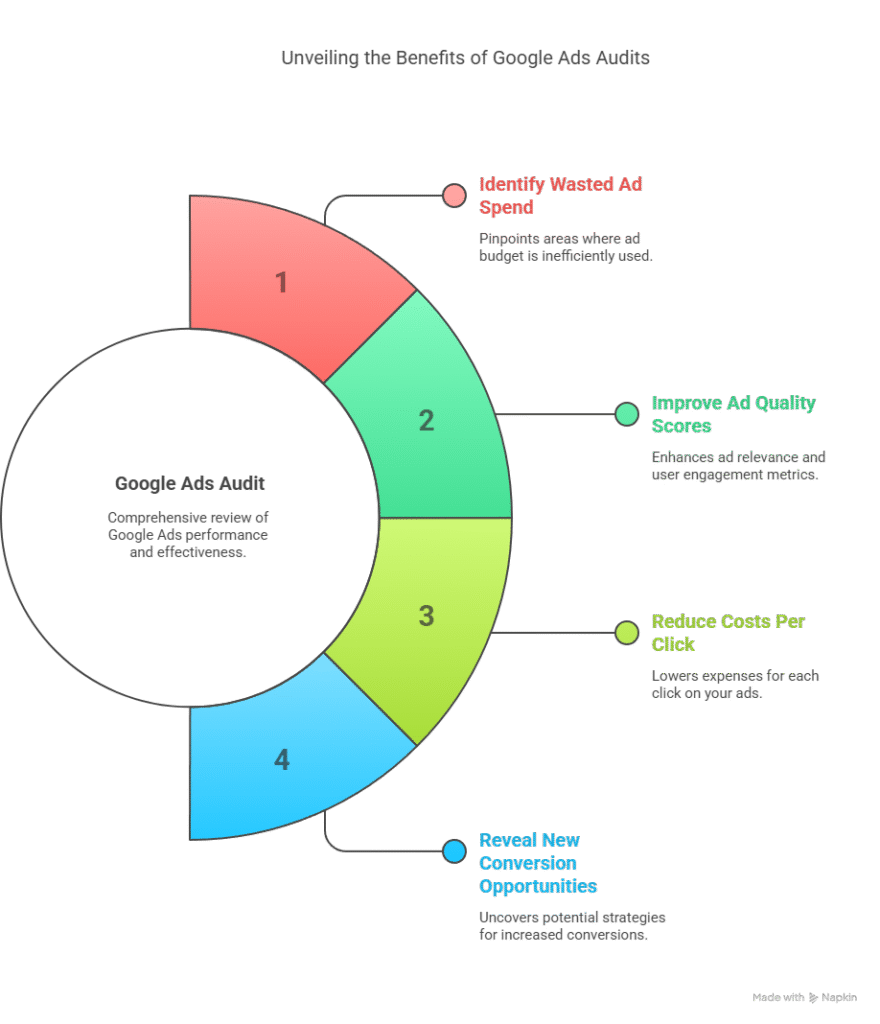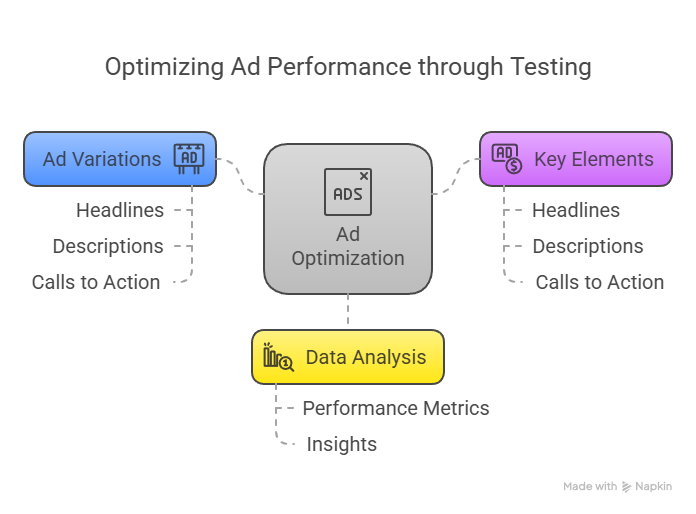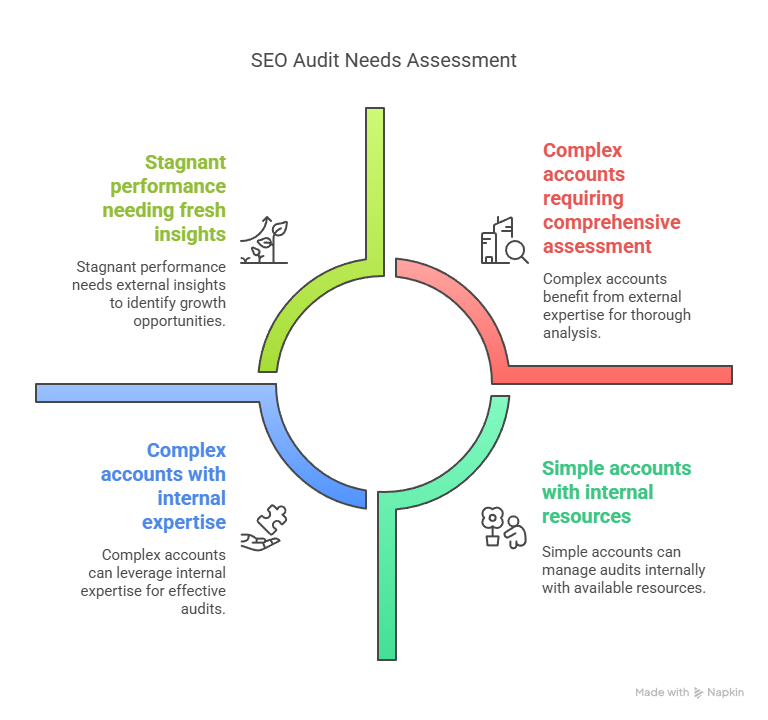If you’re running Google Ads, you might think everything’s going smoothly. But are you really sure? A Google Ads audit can shine a light on parts of your campaigns that need some work. It’s not just about checking the boxes; it’s about making sure your ads are doing their job effectively. In this article, we’ll explore why a Google Ads audit is essential for improving performance and getting better results.

Key Takeaways
- A Google Ads audit helps identify wasted ad spend and inefficiencies.
- Regular audits can improve your ad quality scores and reduce costs per click (CPC).
- Auditing your campaigns regularly reveals new opportunities for higher conversions.
What Is a Google Ads Audit and Why It Matters
Okay, so what’s the deal with a Google Ads audit? Think of it as a google ads health check for your advertising campaigns. It’s like taking your car in for a service – you want to make sure everything’s running smoothly and efficiently.
By conducting a Google Ads audit, you gain clear insight into what’s working, what’s not, and where you can optimize for better results.
But why bother? Well, let’s get into it.
First off, a google ads auditor can help you avoid wasting money. Seriously, ad spend can vanish quickly if you’re not careful. An audit can pinpoint where your budget is going and whether you’re getting a good return on investment. It’s about making sure every dollar counts.
Secondly, it’s about staying competitive. The online advertising landscape is constantly changing. What worked last year might not work today. A google ads audit service keeps you up-to-date with google ads best practice and ensures you’re not falling behind.
Finally, it’s about getting better results. Whether you’re aiming for more leads, sales, or brand awareness, an audit can help you fine-tune your campaigns to achieve your goals. It’s not just about spending less; it’s about getting more bang for your buck.
Think of a Google Ads audit as a regular check-up for your online advertising. It helps you identify problems, optimize performance, and ensure you’re getting the most out of your investment. It’s a proactive approach to managing your campaigns and achieving your business objectives.
Here’s why it’s important:
- It identifies wasted ad spend.
- It improves ad quality and relevance.
- The audit reveals areas where you can optimize for higher conversions.
- It ensures compliance with Google Ads policies.
- It provides insights for strategic decision-making.
So, if you’re serious about your online advertising, learning how to do google ads audit is a must. It’s an investment that can pay off big time in the long run.
Uncovering Wasted Ad Spend and Hidden Inefficiencies
It’s easy to throw money at Google Ads and hope for the best, but without a proper audit, you might be pouring your budget down the drain. A Google Ads audit helps you pinpoint exactly where your ad spend is being wasted and reveals those sneaky inefficiencies that are costing you money. Think of it as a financial check-up for your advertising efforts.
Identifying Underperforming Keywords
One of the most common areas of wasted ad spend is with underperforming keywords. These are the keywords that are costing you money without bringing in any conversions. It’s like paying for a billboard that no one is looking at. An audit will help you identify these keywords so you can pause or remove them, freeing up your budget for more effective targets. I usually check if the keywords have been racking up spend for a long time with little to no conversions.
Analyzing Ad Group Structure
Your ad groups might be a mess. Are your ads relevant to the keywords they’re targeting? Are you using the right match types? A poorly structured ad group can lead to low-quality scores and higher costs per click. A well-organized ad group ensures that your ads are shown to the right people at the right time, maximizing your chances of a conversion. When reviewing campaign structure, I’m not looking for an exact replica of how I’d build it myself.
Evaluating Budget Allocation
Are you allocating your budget effectively? Are some campaigns being starved while others are overfunded? An audit will help you see where your budget is going and whether it’s aligned with your goals. Maybe the campaigns with better performance have more budget while the underperformers have less? It’s important to make sure that your budget is being used in the most efficient way possible. With Google Ads budgets, you can assign a daily or lifetime budget to each campaign, or use a Shared Budget to manage spending across multiple campaigns.
Spotting Device and Location Issues
Are you spending money on mobile users who aren’t converting? Are certain geographic locations draining your budget without producing results? An audit can reveal these hidden trends, allowing you to adjust your targeting and bid strategies accordingly. When analyzing devices, I check if Mobile or Tablet performance stands out significantly to identify opportunities for scaling and increasing volume.
An audit isn’t just about finding problems; it’s about uncovering opportunities. By identifying wasted ad spend and hidden inefficiencies, you can optimize your campaigns for better performance and a higher return on investment.
Reviewing Ad Scheduling
Are your ads running at times when your target audience isn’t online or isn’t likely to convert? An audit can help you identify the most profitable times to run your ads, allowing you to focus your budget on those peak periods. If ads aren’t converting on Sundays or the ‘All Previous Site Visitors’ audience is spending without delivering results, it’s time to reassess those segments.
Improving Ad Quality Scores and Lowering CPC
A strong Quality Score often means lower costs per click and higher ad placements—making it a key factor in campaign success. It’s essentially Google’s way of rewarding advertisers for delivering relevant, helpful experiences to users. A Google Ads audit can pinpoint areas where you can boost your Quality Scores, ultimately saving you money on your campaigns. Let’s face it, nobody wants to pay more than they have to.
Optimizing Ad Relevance
One of the first things an audit will check is how relevant your ads are to the keywords you’re targeting. Are you using those keywords in your ad copy? Does your landing page deliver on the promise made in the ad? If not, your Quality Score will suffer. An audit reveals underperforming keywords and offers guidance on refining ad copy and landing pages to better align with user intent. It’s about making sure everything aligns to provide a better user experience.
Enhancing Landing Page Experience
Your landing page is a critical part of the Quality Score equation. It’s important to Google that users find what they’re looking for and have a smooth experience after clicking your ad. In other words, your landing page needs to match your ad’s message, be user-friendly, and load without delay. An audit will assess your landing page experience and provide recommendations for improvements, such as optimizing page speed, improving mobile-friendliness, and ensuring clear calls to action.
Refining Keyword Groupings
How you group your keywords can also impact your Quality Scores. If you’re lumping too many unrelated keywords into a single ad group, your ads may not be as relevant as they could be. An audit can reveal opportunities to reorganize your keywords into more specific, focused ad groups, helping you craft targeted ads and boost your relevance scores. It’s about creating a structured campaign that speaks directly to the user’s needs.

Think of your Google Ads account as a garden. An audit is like weeding and pruning – removing the underperforming elements and shaping the rest to thrive. It’s not a one-time fix, but a continuous process of refinement.
A/B Testing Ad Copy
- Regularly test different ad variations.
- Focus on headlines, descriptions, and calls to action.
- Analyze the data to see which ads perform best.
By consistently testing and refining your ad copy, you can identify what resonates most with your target audience and improve your click-through rates (CTR), which is a key factor in Quality Score. It’s about finding the right message that compels users to click. This is especially important when Google’s AI might be limiting your campaigns.
Identifying Opportunities for Higher Conversions
Okay, so you’ve checked for wasted spend and improved your Quality Scores. Now, let’s talk about getting more conversions. It’s not just about getting clicks; it’s about turning those clicks into customers.
Conversion Tracking Deep Dive
First, you need to make sure your conversion tracking is set up correctly. Are you tracking all the right actions? Have these actions been assigned to Primary or Secondary? Are any of the conversion actions broken? This is fundamental. If you’re not tracking the right things, you’re flying blind.
- Are all your important conversion actions set as primary?
- Is your conversion tracking working properly?
- Are you tracking micro-conversions (e.g., email sign-ups) in addition to macro-conversions (e.g., sales)?
Bidding Strategy Alignment
Next, take a hard look at your bidding strategies. Are they aligned with your conversion goals? If your main goal is ROAS, but you’re using Target Impression Share, that’s a problem. Each bidding strategy serves a specific purpose, and it’s essential to assess whether the strategies in use are benefiting or hindering your campaigns. Also, are your expectations realistic? You can use a Google Ads Performance Grader to get a quick understanding of how your Google Ads campaign is doing.
Audience and Segmentation Analysis
Time to segment your data. Look at your audience, ad schedule, and location data. Are there any outliers? Are ads not converting on Sundays? Do individuals from the West Coast convert at double the rate of those from other regions? These insights can be used to make bid adjustments or even change your targeting. For devices, is Mobile or Tablet performing drastically better or worse than Desktop?
This could involve adjustments to your ad copy, call-to-action, or even the layout of your landing pages. You should also ensure that Search Partners are enabled and analyze how they perform relative to Google itself. In certain situations, it may be beneficial to recommend enabling Search Partners to expand reach and boost campaign volume.
It’s easy to get caught up in the day-to-day management of your campaigns, but it’s important to take a step back and look at the big picture. Are you really maximizing your conversion potential? Are you leaving money on the table?
How Often You Should Audit and What to Do Next
So, you’re convinced a Google Ads audit is a good idea. Great! But how often should you actually do one? And what happens after the audit is complete? Let’s break it down.
Establishing an Audit Schedule
There’s no one-size-fits-all answer, but here’s a general guideline:
- For new accounts: Audit monthly for the first three months. This helps catch initial setup issues and optimize quickly.
- For established accounts: Audit quarterly. This provides enough data to identify trends without being overwhelming.
- For accounts with significant changes: Audit immediately after major changes, such as a new website launch or a significant shift in marketing strategy. This ensures your Google Ads campaigns are still aligned with your goals.
Consistency is key. Set reminders and block out time in your calendar to ensure audits don’t fall by the wayside.
Implementing Audit Findings

An audit is only as good as the actions you take afterward. Here’s what to do with your findings:
- Prioritize issues: Not all issues are equally important—prioritize the ones that directly affect your ROI the most.
- Create an action plan: Outline specific steps to address each issue. Assign owners and deadlines to ensure accountability.
- Track your progress: Monitor key metrics to see if your changes are having the desired effect. Be prepared to adjust your strategy as needed.
Remember, a Google Ads audit is not a one-time event. It’s an ongoing process of continuous improvement. By regularly auditing your account and implementing the findings, you can ensure that you’re getting the most out of your advertising budget.
Leveraging External Expertise
Sometimes, an outside perspective can be invaluable. Consider these scenarios:
- Lack of internal resources: If you don’t have the time or expertise to conduct a thorough audit, consider hiring a consultant or agency. E2M Solutions offers white label SEO services that can help.
- Stagnant performance: If your account has plateaued, a fresh set of eyes can identify new opportunities for growth.
- Complex accounts: For large or complex accounts, an external audit can provide a more objective and comprehensive assessment.
By following these guidelines, you can ensure that your Google Ads audits are effective and lead to better results.
It’s important to check your audits regularly to keep everything running smoothly. You should aim to do this at least once a year, but if your business is growing or changing quickly, consider doing it every six months. After your audit, take action based on what you find. If you need help or have questions, visit our website for more information and support!
Wrap-Up: The Importance of a Google Ads Audit
In the end, doing a Google Ads audit can really make a difference for your campaigns. It’s like giving your ads a check-up to see what’s working and what’s not. You might find some hidden gems or realize there are things you need to fix. Whether you’re just starting with Google Ads or have been running campaigns for a while, regularly reviewing your account ensures smarter budget use and improved results. So, don’t skip this step! Make it a regular part of your marketing routine, and you’ll likely see improvements in your ad performance.
Frequently Asked Questions
What is a Google Ads audit?
A Google Ads audit involves evaluating your ad campaigns to assess their performance and effectiveness. It helps find problems and ways to make your ads better.
How can an audit help save money?
An audit can show you where you are wasting money on ads that don’t work. By fixing these issues, you can spend your money more wisely.
How often should I do an audit?
It’s a good idea to do a Google Ads audit at least once every few months. This way, you can keep improving your ads and getting better results.






